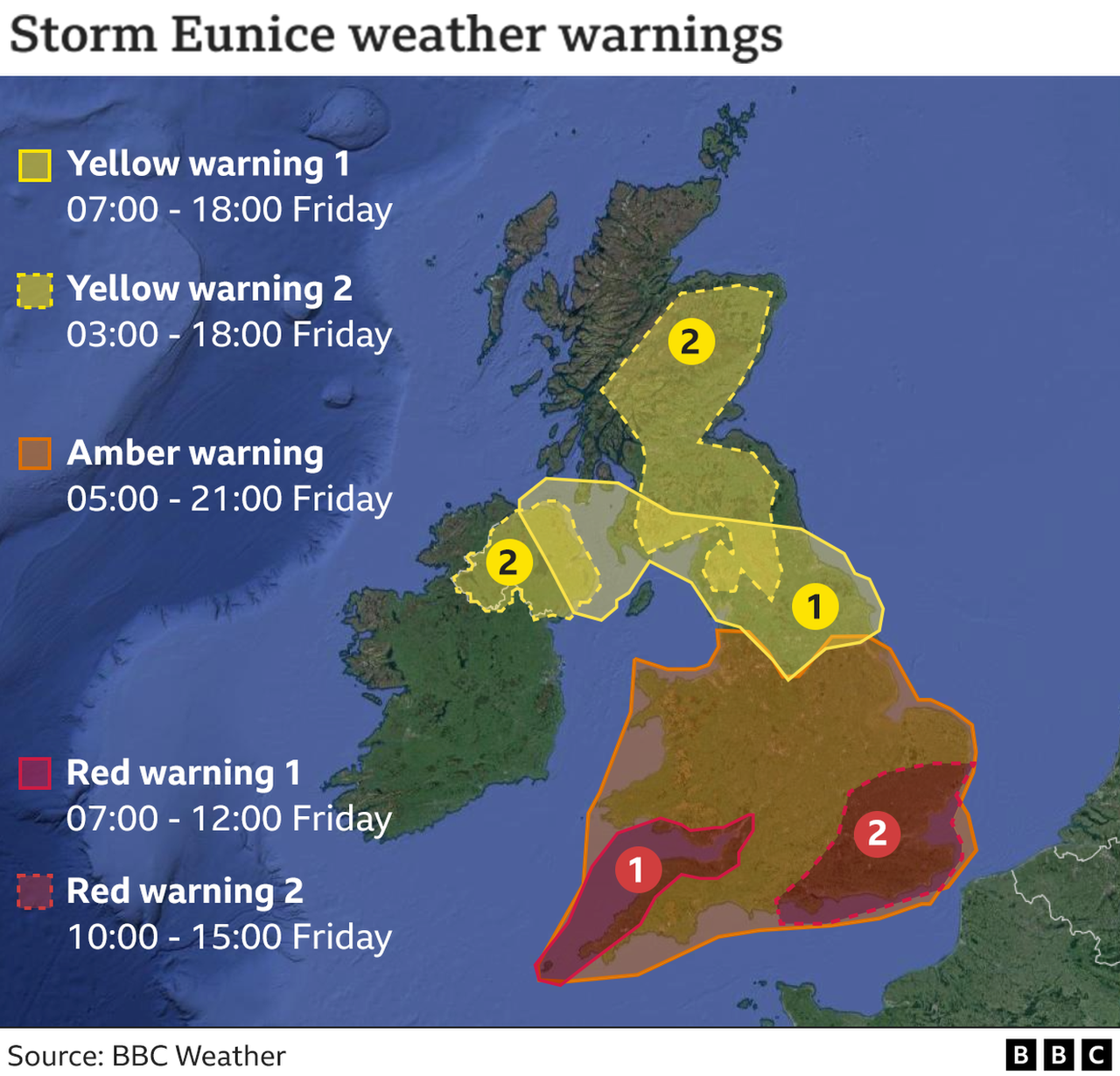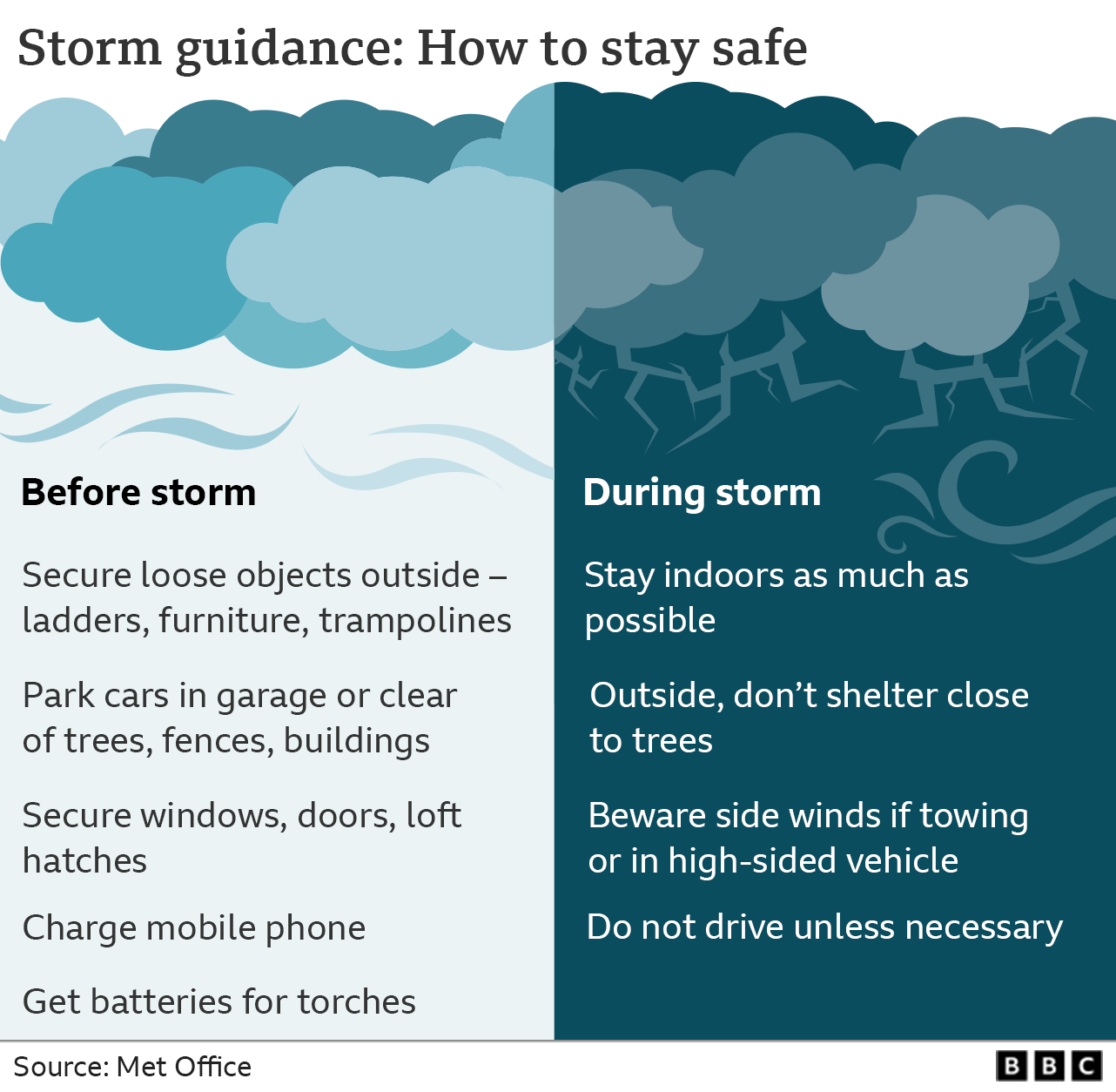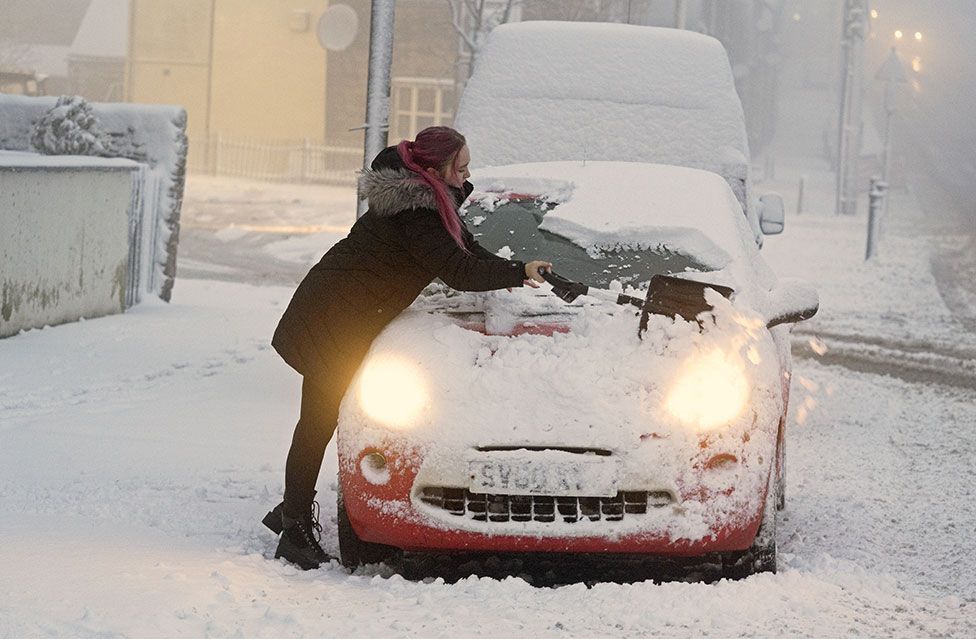News
Storm Eunice: Millions across UK told to stay home as severe winds hit
Millions of people have been told to stay at home as one of the worst storms in decades, Storm Eunice, hits the UK.
Rare red weather warnings – meaning there is a danger to life from flying debris – have been issued by the Met Office covering much of southern and eastern England, and south Wales.
Gusts of up to 92mph have been recorded on the Isle of Wight.
Hundreds of schools are closed and travel networks are experiencing cancellations and major disruption.
Power cuts have left thousands of properties in south-west England and south Wales without power.
BBC Weather said Eunice “could well be one of the worst storms in three decades”.
The Met Office has issued several weather warnings across the UK:
- A red warning for wind – the highest level of alert – along the coastline of Devon, Cornwall and Somerset and south Wales from 07:00 GMT until 12:00 on Friday with gusts of up to 90mph
- A further red warning for wind has been issued for London, south-east England and parts of east England from 10:00 until 15:00
- An amber warning for wind covering all of England south of Manchester and Wales until 21:00 with gusts of up to 80mph
- A yellow warning for snow for much of Scotland, Northern Ireland and northern England from 03:00 until 18:00
- A yellow warning for wind in the Midlands, north-east England, north-west England, parts of Northern Ireland and parts of Scotland from 07:00 until 18:00 with gusts of up to 70mph
- A yellow warning for wind covering London, south-east England, south-west England, Wales and parts of the West Midlands from 06:00 to 18:00 on Saturday

Red weather warnings are rare, and mean that roofs could be blown off, power lines brought down and trees uprooted – as well as flying debris which could cause a danger to life.
The last red warning was for Storm Arwen in November last year, but before that one had not been issued since the so-called “Beast from the East” in 2018.
BBC Weather meteorologist Ben Rich said he expected Eunice to “cause damage, huge disruption and coastal flooding” – but he said it was “impossible to know exactly how bad this storm is going to be”.
“Winds of the same strengths will cause different impacts in different regions of the UK – for example, coasts of western Scotland are far better prepared for 80mph winds than inland parts of southern England.”
People have been warned to “tie down” objects in their gardens, fasten doors and windows and keep cars locked in garages if possible away from trees and walls.
And the Met Office said people should avoid travelling if they could and stay at home when winds reach the highest speeds.
Hundreds of schools are staying shut on Friday due to the high winds in much of Wales and affected areas of England, including in Cornwall, Devon, Somerset, Wiltshire, Hampshire, Dorset and Bristol.
There are concerns that Storm Eunice’s strong winds and a possible storm surge could combine with high spring tides to bring coastal flooding to the west, south-west and the south coast of England.
Ten severe flood warnings – meaning there is a danger to life – are in place on the Severn Estuary and the Wye Estuary. Less serious flood warnings and alerts have been issued for other parts of England, Scotland and Wales.
A government source told the BBC they were “well-prepared” with more than 250 high-volume pumps and 6,000 trained staff able to be deployed, adding they were not taking the threat posed by Eunice “lightly”.
Major incidents have been declared in Cornwall, Gloucestershire, Avon and Somerset and Hampshire.
In Cornwall and Somerset, residents are being urged to stay at home and only travel on Friday if “absolutely necessary”.
Both councils advised people to stay back from cliffs and seafronts due to the danger of large waves, with Cornwall warning of possible flooding during the high spring tides at about 06:00.
The government held an emergency Cobra meeting on Thursday to discuss the response to the incoming storm and Prime Minister Mr Johnson said the Army was “on stand-by” to support those affected.
A second Cobra meeting has been scheduled for Friday morning.

The storm is also expected to bring widespread travel disruption.
All train services in Wales have been suspended on Friday, while rail companies are urging other customers not to travel, with blanket speed restrictions set to be imposed on the main rail lines across the country.
Several train companies and airlines have warned their passengers there will be disruptions to their journeys due to the storm. Some travel companies have urged their passengers to amend their bookings if possible.
Warnings of disrupted services and requests for people not to travel have been issued by Great Western Railway, West Midlands Railway, London North East Railway, Avanti West Coast, East Midlands Railway and CrossCountry trains.
For air travel, British Airways said the rate of aircraft permitted to land at Heathrow Airport was being reduced because of the gale force winds and confirmed it had cancelled flights over the “extreme” conditions at some airports.
Many airports have urged customers to check flights, with Heathrow, London City, Cardiff and Exeter airports are among those to have cancelled flights.
An EasyJet Bordeaux to London Gatwick unsuccessfully tried to land twice, before the plane was forced to return to the French city.
Ferry services have also seen much disruption, with Dover-Calais crossings and many services across the Irish Sea cancelled.
 IMAGE SOURCE,PA MEDIA: The storm has brought significant snowfall to parts of northern England and Scotland
IMAGE SOURCE,PA MEDIA: The storm has brought significant snowfall to parts of northern England and ScotlandNational Highways – which is in charge of England’s motorways and major A-roads – has said there was a “particularly high risk” that high-sided vehicles, caravans and motorbikes could be blown over and has urged drivers of those vehicles not to travel on bridges and viaducts.
Several bridges have closed on Friday, including the M48 Severn Bridge, the A14 Orwell Bridge in Suffolk and the QEII Bridge in Dartford.
In other developments:
- London, Cornwall, Breckland Council near Norfolk and Stoke-On-Trent City Council are opening emergency shelters for people sleeping rough
- Several councils said bin collections would be suspended on Friday
- Legoland in Windsor, the London Eye, the Royal Botanic Gardens at Kew and Wakehurst, and RHS gardens, are among a number of tourist attractions to close
- A red weather warning has also been issued for Counties Kerry and Cork in the south west of the Republic of Ireland, from 03:00 until 08:00 on Friday. Schools in seven counties are also closing
Many people were just recovering from Storm Dudley on Wednesday as they braced for Eunice.
Dudley left thousands of people in north-east England, Cumbria, North Yorkshire and Lancashire without power. Northern Powergrid said it had restored power to all of its more than 20,000 customers affected by the storm by Thursday evening.























